8 Search Results for maureen nevers
September 20, 2018
by Carole Zangari -
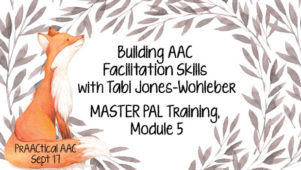
Our AAC Training Series continues today and we are incredibly grateful to Tabi Jones-Wohleber for sharing these presentation materials with us. Today’s training materials center on a topic that is near and dear to my prAACtical heart: Using statements more often than questions. The instructional time for Module 5 is about 90-120 minutes which allows time for discussion and practice. ::::::::::::::::::::::::::::::::::::::::::::::::::::::::::::::::::::::::::::::::::::::::::::::::::::::::::::: Model as a MASTER PAL Module 5: Statements More Than Questions Facilitator Guidelines STATEMENTS MORE THAN QUESTIONS Questions are necessary to help us learn about the things, people, and activities in our environment and beyond. However, interactions heavily weighted with questions do not often yield the quality exchanges required to build relationships, gain understanding, foster autonomous communication or facilitate initiation. This module explores the power of statements (aka nondirective language and descriptive teaching) in shaping meaningful engagement for learning and socially interacting. It includes interactive activities, video links, lots... [Read More...]
November 2, 2016
by Carole Zangari -
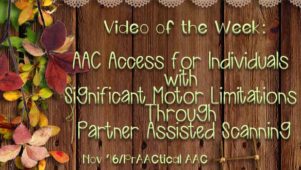
Developing effective communication systems for individuals with significant motor challenges is a challenging process. Ultimately, the goal is to provide them with tools and strategies that allow them to communicate independently and help them develop the skills needed to say what they wish to throughout their daily life experiences. As we all know, this can be a long journey. And while we work toward systems that allow them to communicate independently, they need access to language and communication now despite their motor limitations. Partner assisted scanning (PAS) is one option that works for many AAC learners. In this post, we feature a video overview of this strategy presented by SLP Maureen Nevers as part of the Communication Training Series by the Angelman Syndrome Foundation and the Foster Family Charitable Foundation, and a video of PAS in action by the Dynamic Learning Maps Professional Development (DLM PD) group under the direction... [Read More...]
June 22, 2016
by Carole Zangari -
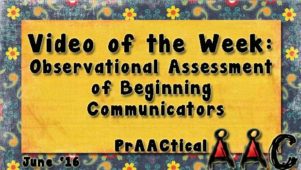
In last week’s video, we heard from SLP Maureen Nevers about the principles and practices used in assessing individuals who are at the beginning stages of communicative development. Today, we continue that theme and focus more specifically on using observation to collect assessment data on the form and function of communication. In this video, Maureen works through some video examples to demonstrate how brief observations of interaction can yield useful information about how and why the individual is communicating. You can visit their Communication Training Series webpage to see more from this wonderful team and get the specific resource documents for this presentation. Many thanks to the Angelman Syndrome Foundation for creating and sharing these videos. Direct Link to Video: https://www.youtube.com/watch?v=1qvvKNZEGMs&list=PLihsTkrStCHZVZBHDC0Qr7z10cYWC0ltx&index=36
June 15, 2016
by Carole Zangari -
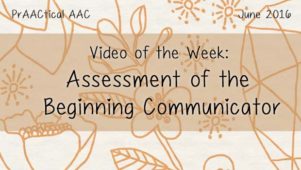
Looking to strengthen your assessment practices with beginning users of AAC? The Angelman Syndrome Foundation’s Communication Training Series has a two-part presentation on this topic that will be of interest to professionals and families alike. In this video, SLP Maureen Nevers discusses a range of prAACtical strategies and tools for gathering meaningful assessment data that helps guide intervention. One important note: Don’t skip this just because you are not currently working with individuals who have Angelman Syndrome. Like their other videos, the information in this presentation is relevant to those working with children, teens, and adults with a wide range of developmental disabilities. Direct Link to Video: https://www.youtube.com/watch?v=pgrsr8a2EKA&index=35&list=PLihsTkrStCHZVZBHDC0Qr7z10cYWC0ltx Kudos to the Angelman Syndrome Foundation for this outstanding series of training videos, and for making them freely available. Interested in this topic? Stay tuned for the second video on this topic in a future post.
June 2, 2016
by Carole Zangari -
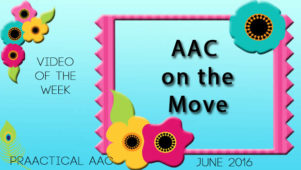
Strategies, tools, and implementation tips. SLP Maureen Nevers packed a lot into this terrific video on AAC strategies. Enjoy! Direct Link to Video – https://www.youtube.com/watch?v=8m9Qow6kWN8
February 3, 2016
by Carole Zangari -
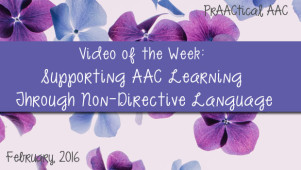
As we’ve mentioned before, The Angelman Syndrome Foundation has done an amazing job of supporting the development of instructional videos on building early communication through AAC. In this week’s featured video, we hear from SLP Maureen Nevers who helps us understand how our own interaction styles can support or impede learners who are not yet fluent with their AAC systems. Whether you are an experienced interventionist or new to the journey of supporting AAC learners, there are lots of helpful suggestions in this video. Many thanks to the ASF for making these videos available to professionals and parents around the world. You can see other posts featuring videos from their communication series here. Direct Link to Video: https://www.youtube.com/watch?v=e0pUzJdWcBU&index=12&list=PLihsTkrStCHZVZBHDC0Qr7z10cYWC0ltx
October 7, 2015
by Carole Zangari -
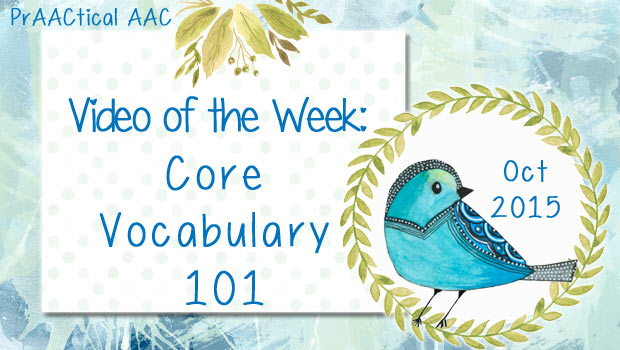
Last month, we featured some wonderful videos from a project of the Angelman Syndrome Foundation that is a great starting point for anyone preparing to implement robust AAC for the first time (you can see that here). Today, we return to the ASF Communication Training Series to get an overview of key constructs in core vocabulary. SLP Maureen Nevers helps us understand the role of core vocabulary in AAC systems and instructional plans (such as IEPs). Even if you are familiar with core vocabulary, this video addresses issues that will support implementation. Many, many thanks to the ASF and the Foster Family Charitable Foundation for the support the provided to create this video and for making it available to all of us.
September 23, 2015
by Carole Zangari -
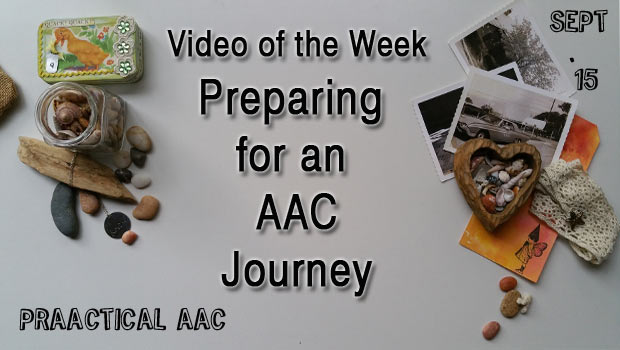
Looking to support a family who is new to AAC? Working with a teacher or SLP who is ready to boost their implementation of AAC across the day? Do we have a resource for you! The Angelman Syndrome Foundation has put together a truly amazing set of videos and support materials to help us get started in AAC implementation. While developed in support of children and adults with Angelman Syndrome, the information has much broader applicability and is appropriate for a wide range of developmental disabilities. The first one, From Goals to Growth: The Essential Elements Of An AAC System, is presented by SLP Maureen Nevers, an AAC Consultant from Burlington, Vermont. It covers the components of an AAC system and learn specific practices to increase the quality of an AAC system. You can get the handout for this presentation here. In the second video of the series, Maureen addresses the... [Read More...]







